#BasavatarakamCancerHospital
Text
Our Senior Neuro-Oncologist Dr. K. Venkateswara Rao provides complete information about #braintumors, myths & facts about brain tumors, diagnosis, and treatment options for brain cancer. This video provides a comprehensive overview of brain tumors.
There are many types of brain tumors. The tumors are formed by abnormal growth of cells and may be either benign or malignant. Benign brain tumors grow and press on nearby areas of the brain. They rarely spread into other tissues and may recur. Malignant brain and spinal cord tumors are likely to grow quickly and spread into other brain tissues.
Malignant brain tumors can affect people of all ages. As always, early detection and treatment may save a life.
Consult a specialist immediately if you observe any of these symptoms.
-Headache, gradually progressing associated with Nausea and vomiting
-Seizures
-Altered Level of Consciousness
- Visual disturbances, Speech Disturbances, Auditory disturbances
- Limb weakness
-Altered level of Consciousness
-Bowel and Bladder Incontinence
Our Neuro-Oncology department offers state-of-the-art care for patients suffering from brain cancers and nerve disorders. In addition, neurologists in the department provide treatment for patients with neurologic complications related to cancer or cancer therapies. The department treats more than 300 newly diagnosed brain tumor patients each year. Under one roof you can go for Surgery, Chemotherapy and Radiotherapy.
#indoamericanhospitalhyderabad#IndoAmericanCancerHospital#BrainCancer#BestNeuroOncologyDoctor#BrainTumors#IndoAmericanHosspitalHyderabad#CancerHospitalsHyderabad#basavatarakamHospital#basavatarakamcancerhospi#BasavatarakamCancerHospital#basavatarakam cancer hospital#basavatarakam#brain cancer#best medical oncologist#best cancer doctors#best oncology hospital in hyderabad#bestcancerhospital#best cancer hospitals in india#indo american hospital hyderabad#indo american hospital#indo american cancer hospital
3 notes
·
View notes
Photo

అక్కడ రాజకీయాల గురించి మాట్లాడనంటున్న బాలకృష్ణ.. అసలు కారణం ఇదే..! #balaiahprograms #balaiahspeech #mlabalaiah #telanganapoliltical #basavatarakamcancerhospital #hindupurammlabalakrishna #pressmeet #andhrapolitical #herobalakrishna #andhrapradesh #politics #telangana https://telugu.newsmeter.in/balakrishana-politics/?feed_id=9091&_unique_id=5e4badac58d66
0 notes
Video
youtube
Nandamuri #Balakrishna Visits #BasavatarakamCancerHospital For Breaking Telugu News Please Subscribe to Our Telegram : https://ift.tt/2swJZtT Watch HMTV Live ►https://youtu.be/naAzroMRrJ8 ► Subscribe to YouTube : http://goo.gl/f9lm5E ► Like us on FB : https://ift.tt/29oVqcx ► Follow us on Twitter : https://twitter.com/hmtvlive ► Follow us on Google+ : https://goo.gl/FNBJo5 ► Visit Us : https://ift.tt/2g5LdE3 ► Visit : https://ift.tt/1dLzZsD
0 notes
Text

Dear All,
As we approach the upcoming election, let's remember that casting our vote isn't just a right; it's a powerful tool to shape our collective destiny. Each ballot represents a voice—a chance to influence the direction of our community and our country.
Whether you're passionate about healthcare, education, the environment, or any other issue, your vote is your opportunity to make a difference. Don't underestimate the impact of your decision at the ballot box.
Let's stand together, exercise our democratic right, and pave the way for a brighter, more inclusive future for all. Your vote matters!
#🇮🇳#ElectionDay2024#YourVoteYourVoice#BasavatarakamCancerHospital#IndoAmericanCancerHospital#IndoAmericanHospitalHyderabad#basavatarakam cancer hospital#best cancer hospital#indo american cancer hospital#best cancer hospitals in india#best cancer treatment in india#basavatarakam hospital#basavatarakamcancerhospital basavatarakam#indo american hospital#basavatarakam#best cancer specialist in india
1 note
·
View note
Text
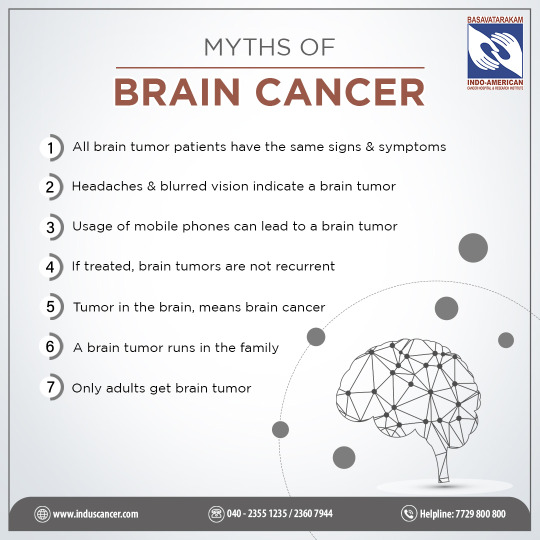
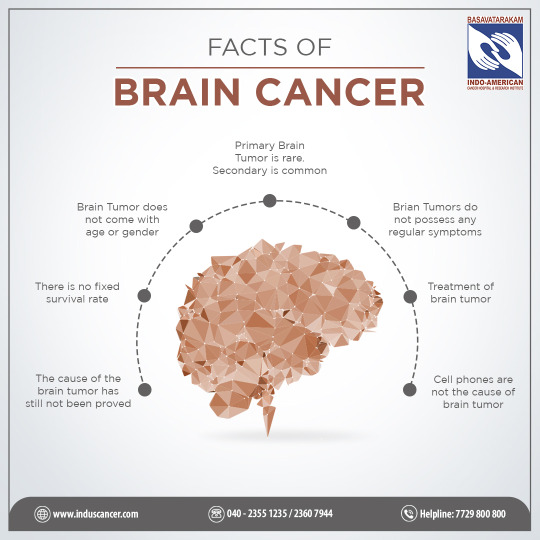
Myths and Facts about Brain Cancer...
Myth: Brain cancer is always fatal.
Fact: While brain cancer can be serious, advances in treatment have improved survival rates, and many people with brain cancer live long, fulfilling lives.
Myth: Brain cancer only affects older adults.
Fact: Brain cancer can occur at any age, from childhood to old age. While it's more common in older adults, younger individuals can also be diagnosed with brain cancer.
Myth: Brain cancer is always inherited.
Fact: Most cases of brain cancer are not inherited. While genetic factors can play a role in some cases, the majority of brain cancers are sporadic and occur by chance.
Myth: Surgery is the only treatment option for brain cancer.
Fact: Surgery is one treatment option for brain cancer, but it's often combined with other therapies such as radiation therapy, chemotherapy, targeted therapy, and immunotherapy for the best outcomes.
Myth: Brain cancer always causes noticeable symptoms.
Fact: Some types of brain cancer may not cause symptoms until they reach an advanced stage. Regular check-ups and screenings can help detect brain cancer early, when treatment is most effective.
Myth: Brain cancer is contagious.
Fact: Brain cancer is not contagious and cannot be spread from person to person through contact.
Myth: Brain cancer treatment always leads to severe side effects.
Fact: While brain cancer treatment can cause side effects, advances in medical technology and supportive care have helped minimize these effects and improve quality of life for patients.
By dispelling myths and understanding the facts about brain cancer, we can raise awareness, reduce stigma, and support those affected by this disease. If you have questions or concerns about brain cancer, consult with our experts at Basavatarakam Indo American Cancer Hospital & Research Institute.
#braincancerawareness#mythsandfacts#braintumors#BasavatarakamCancerHospital#IndoAmericanHospitalHyderabad#IndoAmericanCancerHospital#indoamericanhospital#BestCancerHospitalInIndia#best cancer treatment in india#best cancer hospital#indo american cancer hospital#best cancer hospitals in india#basavatarakam hospital#indo american hospital#basavatarakam#best cancer specialist in india#basavatarakam cancer hospital#basavatarakamcancerhospital basavatarakam
0 notes
Text
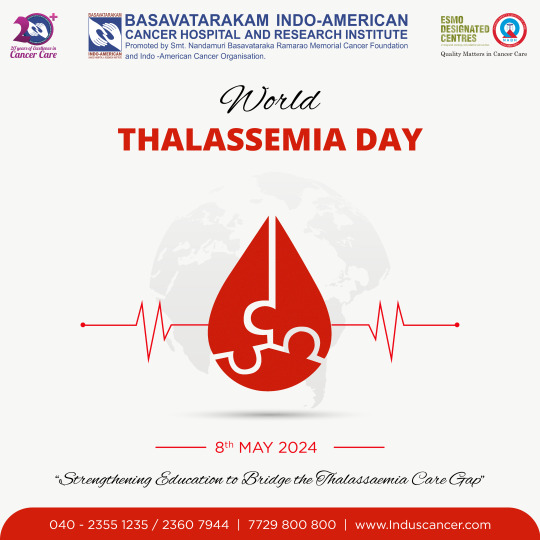
Today, on World Thalassaemia Day.
Understanding Thalassaemia:
Thalassaemia is an inherited blood disorder characterized by abnormal hemoglobin production, leading to anemia. This condition affects the body's ability to produce sufficient healthy red blood cells, resulting in fatigue, weakness, and other complications.
Causes:
Thalassaemia is caused by mutations in the genes responsible for hemoglobin production. These mutations affect the synthesis of hemoglobin, leading to abnormal or insufficient red blood cell production.
Signs and Symptoms:
1. Fatigue and weakness
2. Pale skin
3. Shortness of breath
4. Delayed growth and development
5. Jaundice (yellowing of the skin and eyes)
6. Enlarged spleen and liver
Prevention:
While Thalassaemia is a genetic condition that cannot be prevented, individuals can undergo genetic counseling and testing to assess their risk of passing on the condition to their children. Prenatal screening and diagnosis can also help identify affected pregnancies early, allowing for appropriate management and support.
Let's raise awareness and support those affected by Thalassaemia on this World Thalassaemia Day!
#WorldThalassaemiaDay#BasavatarakamCancerHospital#IndoAmericanCancerHospital#IndoAmericanHospitalHyderabad#indoamericanhospital#BestCancerHospital#basavatarakam cancer hospital#best cancer hospitals in india#basavatarakam hospital#indo american cancer hospital#best cancer treatment in india#basavatarakam#best cancer specialist in india#best cancer hospital#basavatarakamcancerhospital basavatarakam#indo american hospital
0 notes
Text
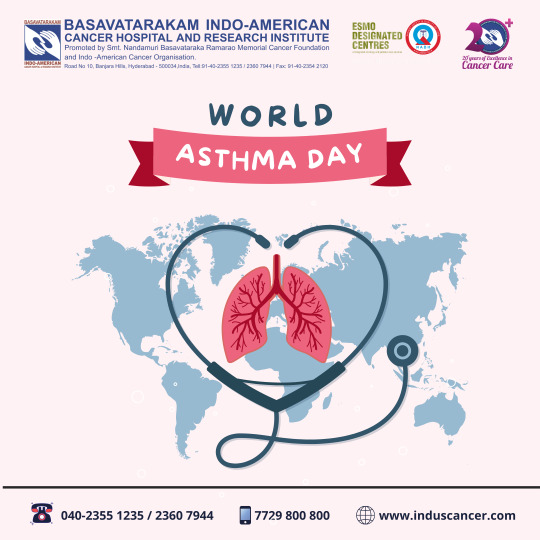
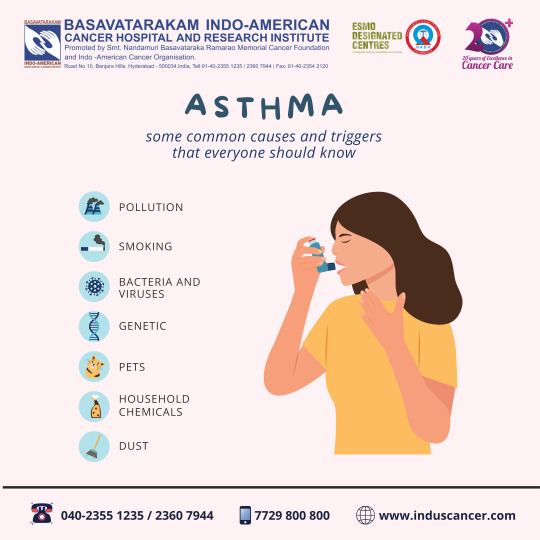
World Asthma Day: Breathing Easy Together...
What is Asthma?
Asthma is a chronic lung disease characterized by inflammation and narrowing of the airways, leading to recurrent episodes of wheezing, breathlessness, chest tightness, and coughing. The signs and symptoms of asthma can vary from person to person and may range from mild to severe.
Common Signs and Symptoms:
Shortness of Breath: Difficulty breathing, especially during physical activities or at night.
Wheezing: A whistling sound when exhaling, audible even without a stethoscope.
Coughing: Persistent, often triggered by cold air, exercise, or allergens.
Chest Tightness: A sensation of pressure in the chest.
Increased Mucus Production: Excessive mucus in the airways, leading to congestion.
Fatigue: Feeling tired, especially during or after asthma flare-ups.
Anxiety or Panic: Feelings of anxiety during asthma attacks.
Why Awareness Matters:
Empowerment: Understanding asthma empowers individuals to manage their condition effectively.
Early Detection: Awareness leads to early detection, allowing for timely intervention.
Reducing Stigma: Raising awareness combats stigma and promotes empathy for those with asthma.
If you experience any of these symptoms, seek medical attention promptly. Early diagnosis and proper management can improve your quality of life.
#WorldAsthmaDay#asthmaawareness#BasavatarakamCancerHospital#IndoAmerican#IndoAmericanHospitalHyderabad#IndoAmericanCancerHospital#basavatarakam cancer hospital#best cancer hospital#indo american cancer hospital#best cancer hospitals in india#best cancer treatment in india#basavatarakam#basavatarakam hospital#indo american hospital#basavatarakamcancerhospital basavatarakam#best cancer specialist in india
1 note
·
View note
Text
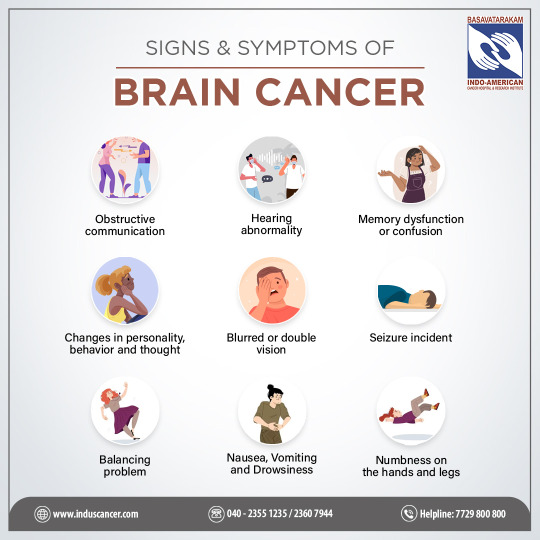
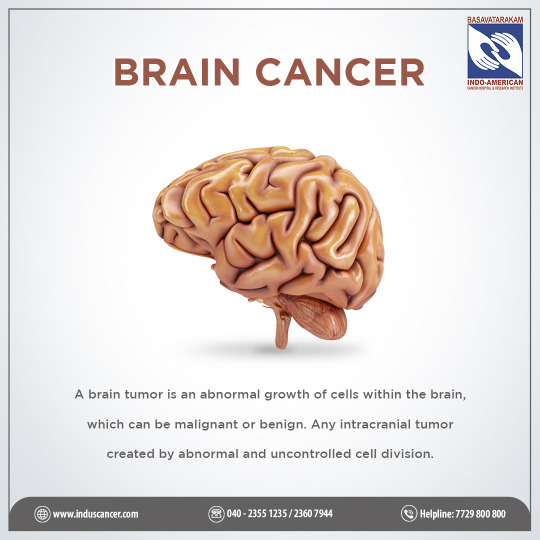
**What is Brain Cancer?**
Brain cancer occurs when abnormal cells in the brain grow in an uncontrollable manner. These cancers can be primary (starting in the brain) or secondary (spreading to the brain from other parts of the body).
**Signs and Symptoms of Brain Cancer:**
- Persistent headaches
- Seizures or convulsions
- Difficulty with thinking, speaking, or finding words
- Personality or behavior changes
- Dizziness or unsteadiness
- Vision problems, such as blurred vision, double vision, or loss of peripheral vision
- Hearing problems
- Nausea or vomiting, especially in the morning
These symptoms can be caused by various conditions, and having them does not necessarily mean that a person has brain cancer. However, if you or someone you know is experiencing any of these symptoms, it's important to consult a healthcare professional for a thorough evaluation.
This May, let's spread the word and raise awareness about brain cancer. Early detection can make a significant difference in treatment and management. Stay informed, stay vigilant, and support brain cancer research and education.
#IndoAmericanHospitalHyderabad#BasavatarakamCancerHospital#braintumour#braincancerawareness#braincancer#braintumorawareness#RiskFactors#Cancer#cancerhospitalinhyderabad#best cancer treatment in india#best cancer hospitals in india#basavatarakam hospital#best cancer hospital#basavatarakam cancer hospital#indo american hospital#basavatarakam#best cancer specialist in india#basavatarakamcancerhospital basavatarakam#indo american cancer hospital
1 note
·
View note
Text
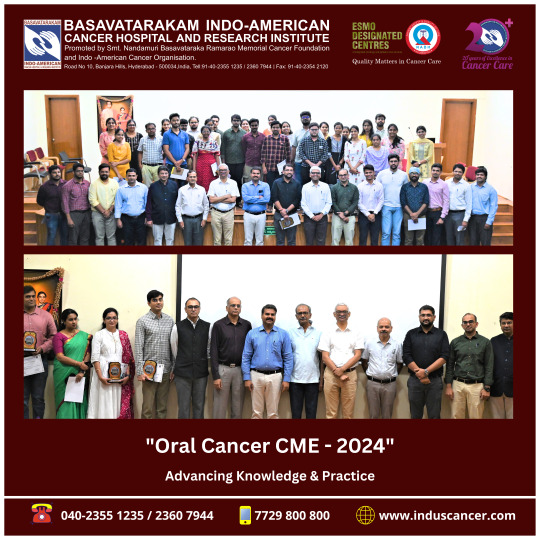
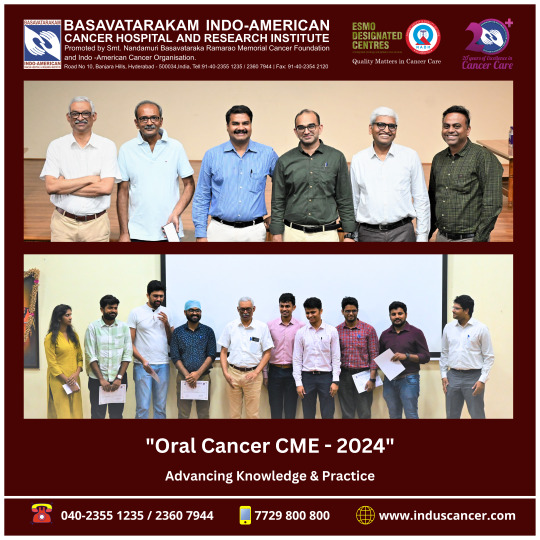
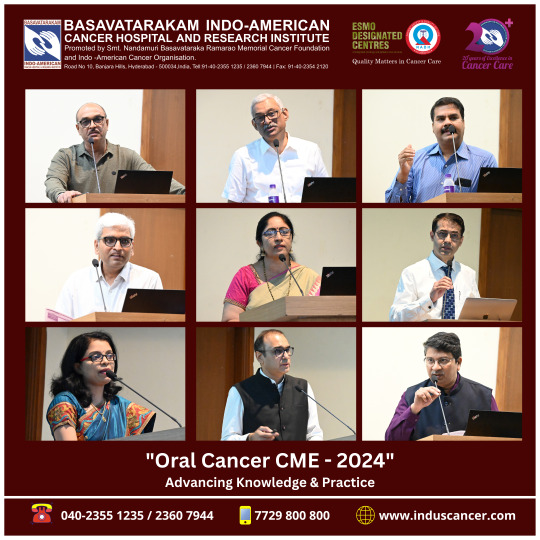
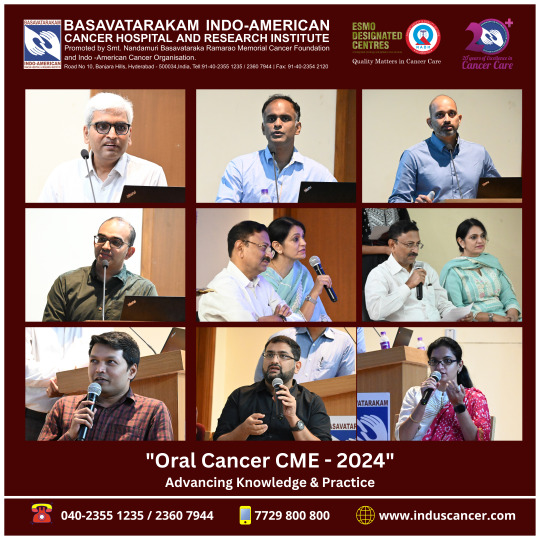
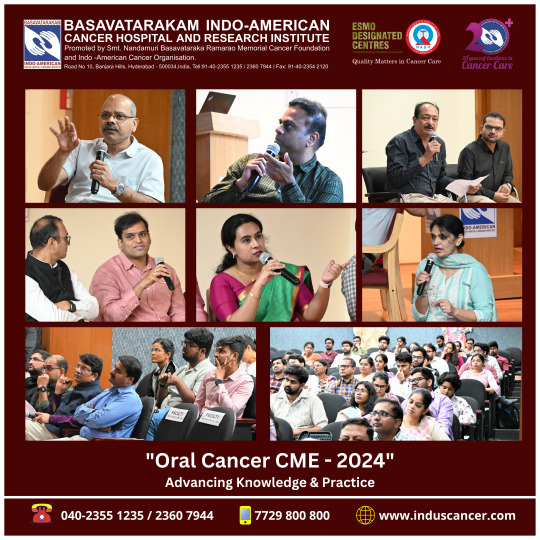
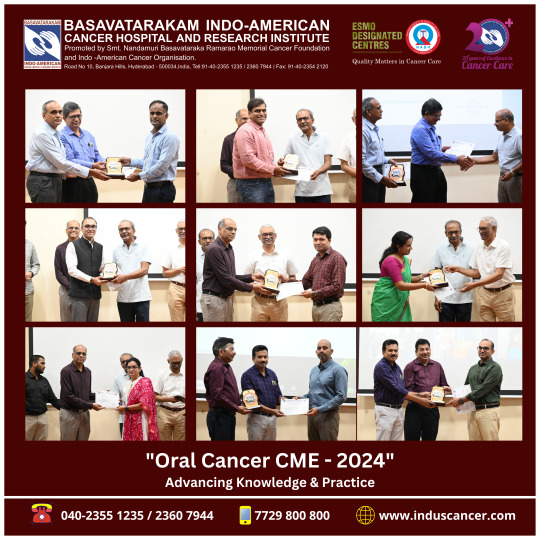
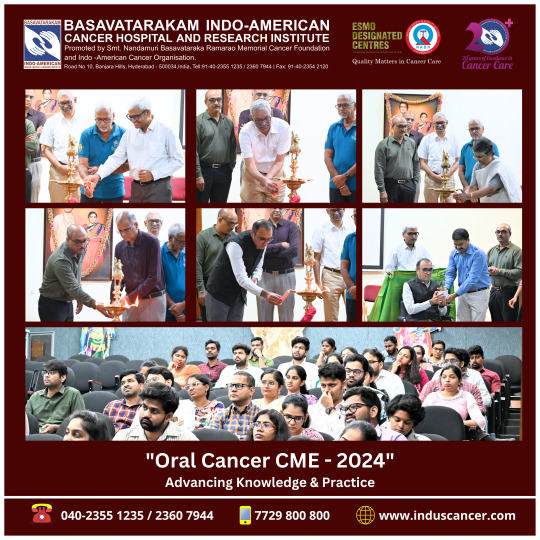
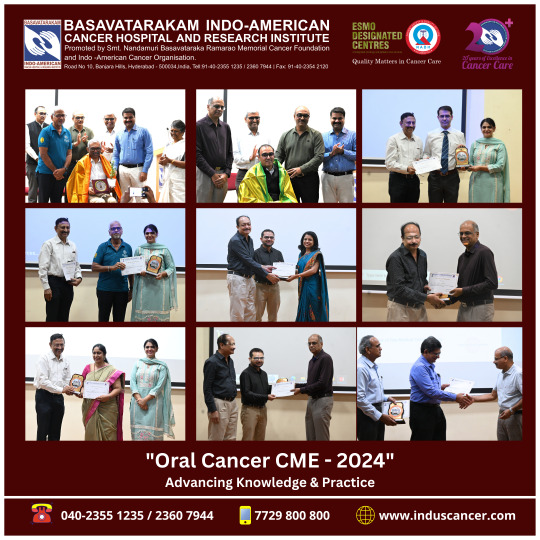
Today, the Department of Head and Neck Oncology at Basavatarakam Indo American Cancer Hospital & Research Institute hosted an enlightening one-day CME titled "Oral Cancer CME 2024 - Advancing Knowledge and Practice." Under the expert guidance of our esteemed Medical Director Dr. T. Subramanyeshwar Rao, Chief and HOD Dr. L M Chandra Sekhar Rao, and Organizing Secretary Dr. Hemant Nemade, this event marked a significant step forward in the battle against oral cancer.
*Event Insights:*
This pivotal conference brought together renowned head and neck oncology professionals, faculty, consultants, and students from across Telangana and Andhra Pradesh to delve deep into the latest advancements and collaborative strategies aimed at combating oral cancer.
*Covered Topics Included:*
1. *Potentially Malignant Lesions of the Oral Cavity* - Identifying early signs to prevent cancer development.
2. *Comprehensive Assessment of Oral Cancer* - Enhancing diagnostic accuracy and treatment planning.
3. *Role of the Surgical Pathologist* - Crucial insights into tissue analysis and its impact on therapy decisions.
4. *Compartmental Resection/ITF Clearance* - Discussing surgical precision in tumor removal.
5. *N0 Neck in Oral Cancer: 'To Do or Not to Do'* - Evaluating the necessity of neck dissection.
6. *Research Opportunities in OSCC* - Spotlighting current studies and future prospects.
7. *OSCC: Future Directions* - Exploring innovative therapies and technologies.
8. *The Hidden 'R' in Oncology* - Understanding the role of 'Rehabilitation' in cancer care.
*Panel Discussions Focused On:*
- *Oral Cancer: Key Concepts* - Fundamental ideas shaping current treatment paradigms.
- *Taming the Recurrences* - Strategies to prevent and manage the return of cancer.
Together, we are lighting the path to a brighter tomorrow, inspiring action, and fostering hope for all those affected by oral cancer. Our collective efforts continue to push the boundaries of what is possible in oncology.
Thank You to all the participants and speakers for making this event a reservoir of knowledge and inspiration. Let's continue to collaborate and innovate in our relentless pursuit of conquering cancer.
#headandneckcancer#oralcancer#oralcancerawareness#drlmchandrasekhararao#BasavatarakamCancerHospital#IndoAmericanCancerHospital#IndoAmericanHospitalHyderabad#best cancer treatment in india#best cancer hospital#indo american cancer hospital#basavatarakam hospital#basavatarakam#best cancer hospitals in india#basavatarakam cancer hospital#indo american hospital#basavatarakamcancerhospital basavatarakam#best cancer specialist in india
1 note
·
View note
Text
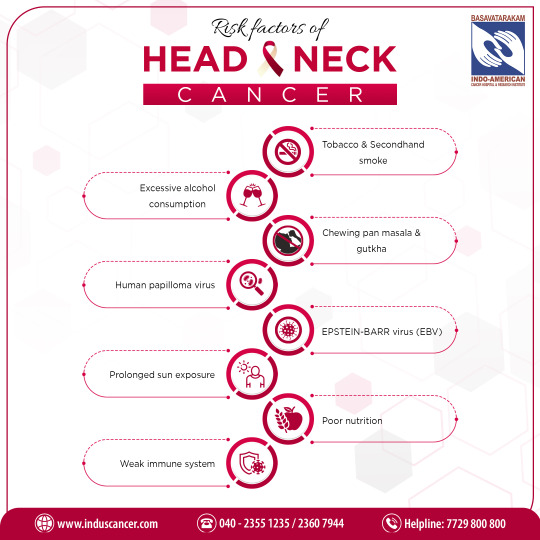
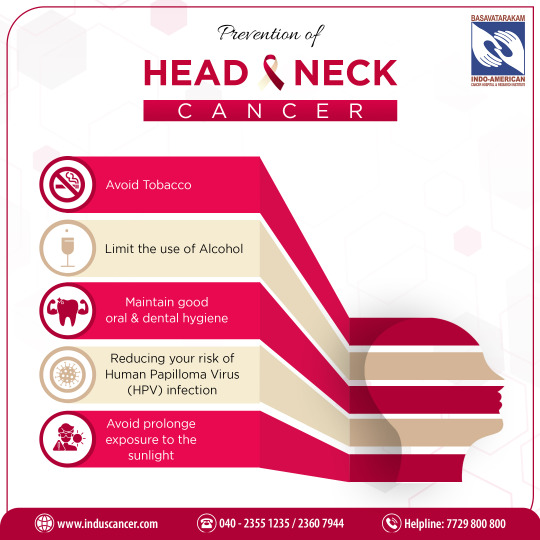
Head and neck cancers can affect anyone, but certain factors may increase the risk. It's crucial to stay informed and take preventive measures. Here are some key risk factors and prevention tips:
Risk Factors:-
Tobacco use, including smoking and chewing tobacco
Excessive alcohol consumption
Human papillomavirus (HPV) infection
Prolonged sun exposure, which can lead to skin cancers in the head and neck area
Poor oral hygiene and chronic irritation of the mouth or throat
Occupational exposure to certain chemicals and substances
Age, with risk increasing as you get older
Prevention Tips:-
Quit smoking and avoid tobacco in any form
Limit alcohol consumption
Practice safe sex to reduce the risk of HPV infection
Wear protective clothing and sunscreen to shield your skin from harmful UV rays
Maintain good oral hygiene and visit your dentist regularly
Use protective equipment in your workplace if exposed to hazardous substances
Stay vigilant and report any unusual symptoms to your healthcare provider
By staying informed about the risk factors and adopting healthy lifestyle habits, you can reduce your risk of developing head and neck cancers. Remember, early detection is key, so don't hesitate to seek medical attention if you notice any concerning symptoms.
Let's spread awareness and empower each other to prioritize our health!
#BasavatarakamCancerHospital#IndoAmericanHospitalHyderabad#cancerhospitalhyderabad#BestCancerHospital#HeadAndNeckCancerAwareness#drlmchandrasekharrao#HeadAndNeckCancer#prevention#HealthAwareness#best cancer treatment in india#best cancer hospital#indo american cancer hospital#basavatarakam hospital#basavatarakam#best cancer hospitals in india#basavatarakam cancer hospital#indo american hospital#best cancer specialist in india#basavatarakamcancerhospital basavatarakam
1 note
·
View note
Text


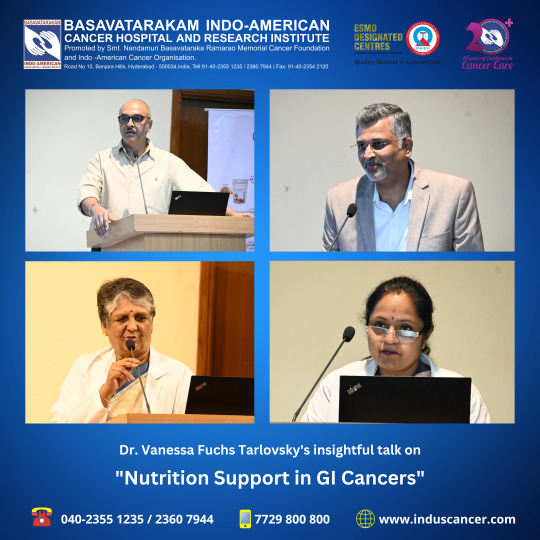
We're excited to announce the resounding success of yesterday's guest lecture featuring Dr. Vanessa Fuchs Tarlovsky from the Dept. of Clinical Nutrition and Oncology at Hospital General de Mexico!
Dr. Tarlovsky's insightful talk on "Nutrition Support in GI Cancers" illuminated crucial strategies for supporting patients through their cancer journey.
From dietary considerations to personalized nutrition plans, her expertise provided invaluable guidance in optimizing patient outcomes in gastrointestinal cancer care.
Thank you to all who attended this engaging session, including Faculty, Consultants, DrNB/DNB/FNB Residents, Dietitians, and Diploma Oncology Nursing Students. Your active participation made this event truly exceptional!
Stay tuned for more empowering events and educational opportunities at BIACH&RI!
#guestlecture#nutritionsupport#GIcancer#EmpoweringCare#BasavatarakamCancerHospital#IndoAmericanHospitalHyderabad#indoamericanhospital#cancerhospitalhyderabad#basavatarakam#best cancer hospital#indo american cancer hospital#best cancer hospitals in india#best cancer treatment in india#basavatarakam cancer hospital#basavatarakamcancerhospital basavatarakam#basavatarakam hospital#indo american hospital#best cancer specialist in india
1 note
·
View note
Text
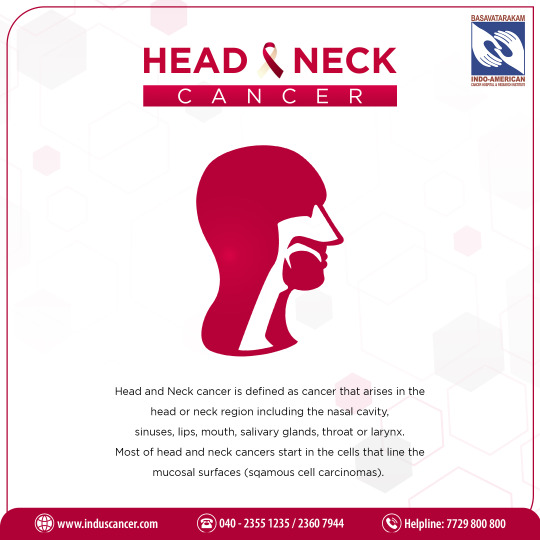

Understanding Head and Neck Cancer: Signs and Symptoms
Head and neck cancer encompasses a range of cancers that occur in the mouth, throat, nose, sinuses, salivary glands, and other areas of the head and neck region.
Signs and Symptoms of Head and Neck Cancer:
Persistent Sore Throat: A sore throat that doesn't heal or keeps coming back.
Hoarseness or Change in Voice: Persistent hoarseness or a change in voice quality.
Difficulty Swallowing (Dysphagia): Difficulty swallowing, also known as dysphagia.
Persistent Ear Pain: Pain in the ears that doesn't go away, especially if it's on one side.
Lump or Swelling: A lump, bump, or swelling in the neck, mouth, or throat.
Persistent Mouth Sores: Sores in the mouth or throat that don't heal within a few weeks.
Unexplained Weight Loss: Significant weight loss without dieting or trying to lose weight.
Persistent Cough: A cough that persists and doesn't go away, especially if accompanied by blood.
Early Detection Saves Lives:
If you experience any of these symptoms, especially if they persist for more than a few weeks, it's essential to consult with our specialists for evaluation and appropriate testing. Early detection significantly improves treatment outcomes, offering the best chance for successful recovery.
Stay informed, stay vigilant. Your health matters!
#HeadAndNeckCancerAwareness#EarlyDetection#BasavatarakamCancerHospital#stayinformed#indoamericanhospital#IndoAmericanHospitalHyderabad#fightcancertogether#best cancer treatment in india#basavatarakam hospital#indo american cancer hospital#best cancer hospital#indo american hospital#best cancer hospitals in india#basavatarakam#basavatarakam cancer hospital#best cancer specialist in india#basavatarakamcancerhospital basavatarakam
1 note
·
View note
Text
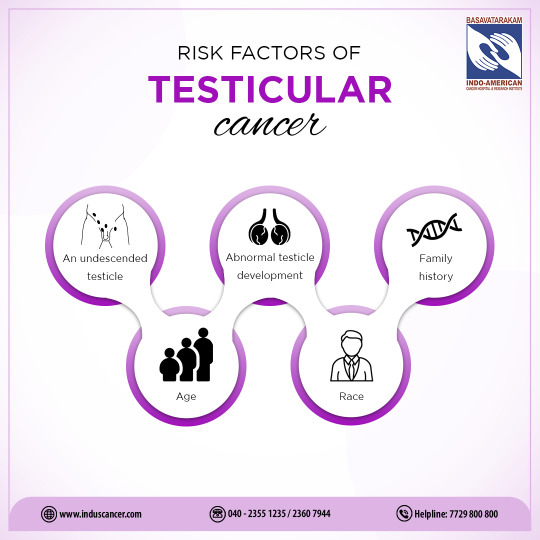
Today, we're shedding light on the risk factors associated with testicular cancer, which predominantly affects young men but can be managed with early diagnosis.
Key Risk Factors for Testicular Cancer:
Age: Most common in men aged 15-35.
Family History: A family history of testicular cancer increases risk.
Personal History: Having had testicular cancer in one testicle
increases the risk of developing it in the other testicle.
Undescended Testicle (Cryptorchidism): Men whose testicles did not descend into the scrotum normally before birth are at a higher risk.
Race & Ethnicity: Rates of testicular cancer are higher in Caucasian men than in men of other races.
Body Size: Recent studies suggest that taller men may have a slightly increased risk of testicular cancer.
Prevention and Early Detection:
While some risk factors like genetic predisposition can't be changed, awareness and regular self-examinations play a crucial role in early detection. If you have any of the risk factors or notice any changes, consult with our specialists for guidance and screening.
Let's work together to spread awareness and safeguard our health. Knowledge is power!
#TesticularCancerAwarenessMonth#MensHealthMattersh#BasavatarakamCancerHospital#cancerpreventionn#stayinformedabout#IndoAmericanHospitalHyderabad#basavatarakam#best cancer treatment in india#indo american cancer hospital#best cancer hospital#indo american hospital#basavatarakam hospital#basavatarakam cancer hospital#best cancer hospitals in india#best cancer specialist in india#basavatarakamcancerhospital basavatarakam
1 note
·
View note
Text
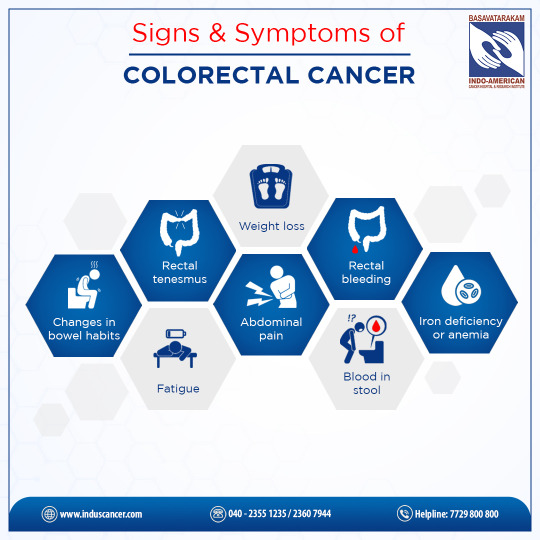

Colorectal cancer is a silent threat that often shows no symptoms until it's in advanced stages. But early detection saves lives! Here are some signs to watch for:
1️⃣ Changes in bowel habits
2️⃣ Blood in stool
3️⃣ Abdominal discomfort or pain
4️⃣ Unexplained weight loss
5️⃣ Fatigue or weakness
Prevention is key! Take these steps to lower your risk:
✅Regular screenings, especially if you're over 50
✅ Maintain a healthy diet with plenty of fiber-rich foods
✅ Stay active with regular exercise
✅ Limit alcohol intake
✅ Avoid smoking
At Basavatarakam Indo American Cancer Hospital and Research Institute (BIACH&RI), we're dedicated to spreading awareness and providing excellent care for colorectal cancer. Don't wait—schedule your screening today and prioritize your health!
Our Toll Free Number: 040 - 2355 1235 / 7729 800 800
#colorectalcancerawareness#earlydetection#coloncancer#rectalcancer#BasavatarakamCancerHospital#IndoAmericanCancerHospital#IndoAmericanHospitalHyderabad#best cancer treatment in india#indo american cancer hospital#best cancer hospital#indo american hospital#basavatarakam hospital#best cancer hospitals in india#basavatarakam cancer hospital#basavatarakam#basavatarakamcancerhospital basavatarakam#best cancer specialist in india
1 note
·
View note
Text

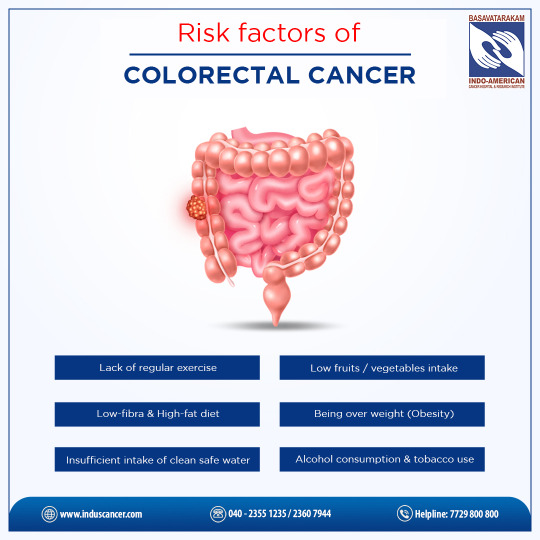
What is Colorectal Cancer?
Colorectal cancer, also known as bowel cancer, occurs in the colon or rectum, forming malignant growths. These growths, called tumors, can invade and damage nearby tissues and spread to other parts of the body.

Age: The risk of colorectal cancer increases with age, with most cases diagnosed in individuals over 50.
Family History: A family history of colorectal cancer or polyps increases the risk, especially if a close relative was diagnosed before age 50.
Personal History: Individuals with a history of colorectal cancer, polyps, or inflammatory bowel disease (such as Crohn's disease or ulcerative colitis) are at higher risk.
Lifestyle Factors: Poor diet (low in fiber, high in red or processed meats), lack of physical activity, obesity, smoking, and heavy alcohol consumption can increase the risk.
Genetics: Some inherited gene mutations, such as Lynch syndrome and familial adenomatous polyposis (FAP), can significantly increase the risk of colorectal cancer.
Race and Ethnicity: African Americans have a higher risk of colorectal cancer than other racial or ethnic groups.
Early detection through regular screenings, such as colonoscopies, can greatly improve treatment outcomes. If you're concerned about your risk or have symptoms, don't hesitate to reach out to our expert team at Basavatarakam Indo American Cancer Hospital.
We're here to support you every step of the way. Stay informed, stay proactive, and together, let's fight colorectal cancer!
#ColorectalCancerAwareness#knowthefacts#earlydetection#BasavatarakamHospital#IndoAmericanCancerHospital#IndoAmericanHospitalHyderabad#BasavatarakamCancerHospital#best cancer treatment in india#best cancer hospital#indo american cancer hospital#best cancer hospitals in india#basavatarakam hospital#indo american hospital#basavatarakam cancer hospital#best cancer specialist in india#basavatarakam#basavatarakamcancerhospital basavatarakam
1 note
·
View note
Text
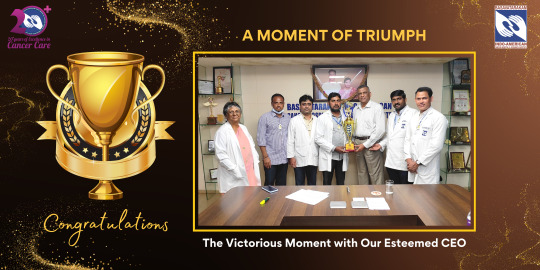

We are delighted to share the exhilarating news of our triumph in the recent Radiotherapy Cricket Championship 2024, Hyderabad.
Against formidable competition from the Teams from different cancer hospitals across Hyderabad, our Basavatarakam Indo American Cancer Hospital - Department of Radiation Oncology Team emerged as the triumphant winner. Our team displayed exceptional sportsmanship, skill, and determination, ultimately securing the coveted championship title.
The Radiotherapy Cricket Championship 2024 featured participation from nine prominent cancer hospitals, Apollo, KIMS, MNJIO & RCC, Malla Reddy Cancer Hospital, NIMS, Omega Cancer Hospital, Renova, and Yashoda Hospital. In the face of tough competition, our Team demonstrated unparalleled teamwork, resilience and emerged triumphant won the cup.
Their victory have brought immense pride and glory to our esteemed institution.
We extend our heartfelt congratulations to each member of the Basavatarakam Indo American Cancer Hospital - Department of Radiation Oncology Team for their outstanding performance and remarkable teamwork.
Let us continue to uphold the spirit of sportsmanship, camaraderie.
Once again, congratulations to our victorious team!
#CricketChampions#BasavatarakamCancerHospital#radiationoncolgy#radiotherapy#IndoAmericanHospitalHyderabad#IndoAmericanCancerHospital#best cancer treatment in india#best cancer hospital#best cancer hospitals in india#basavatarakam hospital#indo american hospital#best cancer specialist in india#indo american cancer hospital#basavatarakam cancer hospital#basavatarakam#basavatarakamcancerhospital basavatarakam
1 note
·
View note